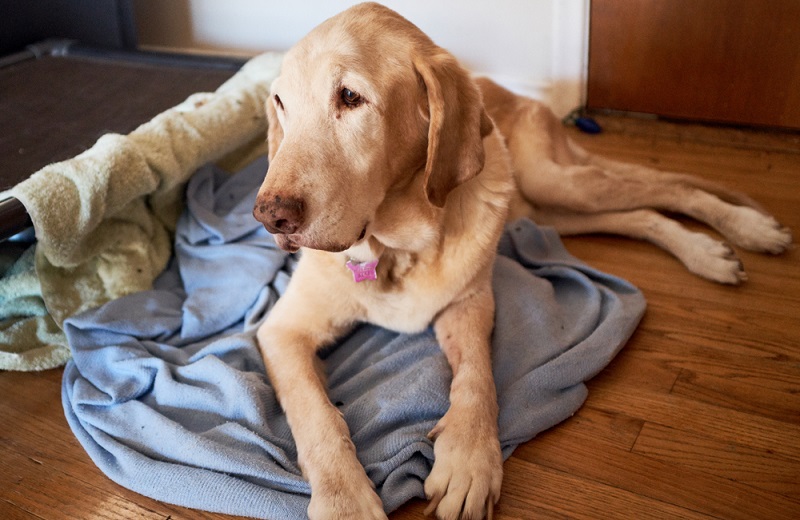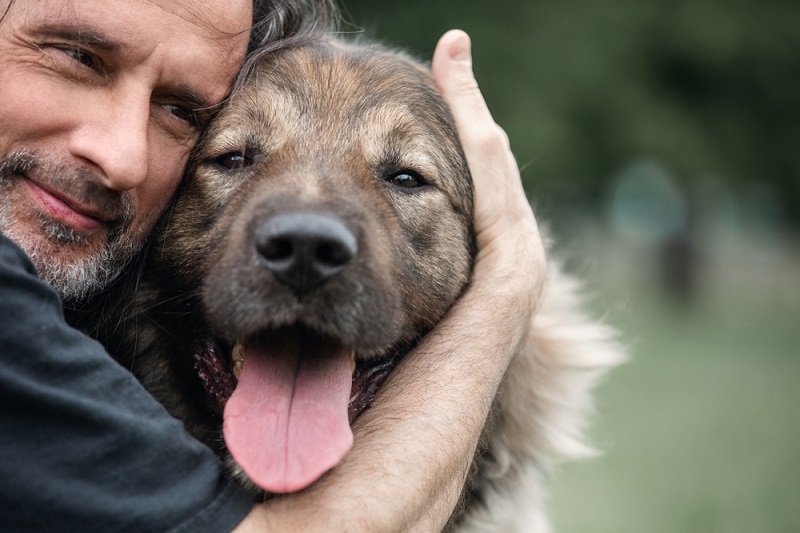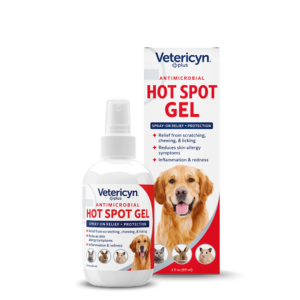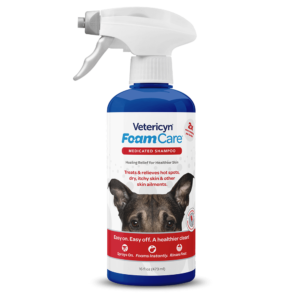In the fight against germs, dogs (and people) rely on one critical line of defense: the skin. A barrier against troublemaking bacteria, the skin provides us with much-needed protection and peace of mind.
However, as dogs age, their immune systems weaken, which undermines the skin’s protective measures. They also face a higher risk of vitamin deficiencies and infection.1 For these reasons, old dog skin problems tend to crop up—and sometimes become chronic.
If your senior furry friend has started ceaselessly scratching or licking at inflamed patches of fur, they’re dealing with skin issues. Fortunately, an older dog itching constantly doesn’t have to be your new reality. By understanding the causes, treatments, and prevention tips, you can help your canine companion feel comfortable and happy in their own skin.
Common Skin Problems in Older Dogs
As dogs age, skin problems can start to pop up. In fact, you might notice any of the following:
- Dry, thin, or cracked skin – Age reduces skin’s natural elasticity and oil reserves. This causes once springy skin to become brittle and cracked. Older skin also struggles to retain moisture, which can lead to parched patches.
- Itching, allergies, and irritation – Dogs of all ages can come down with allergies, but since senior dogs lack the robust immune defenses of young pups, they often struggle to ward them off. Such allergies can trigger uncomfortable symptoms, like itchy paws on dogs.
- Infections (bacterial, yeast, or parasitic) – Bacteria have an easier time infiltrating compromised skin, so infections can become more common in a dog’s golden years. Allergies and age-related hormonal shifts can also undermine defenses. Dogs affected by weak immunity may also develop secondary skin conditions that require professional care.
- Lumps, bumps, and calluses – Frail skin also takes extra damage from incidental contact, so calluses on paws may pop up more often. Older dogs can also grow prone to growths like papillomas, ear hematomas, and cysts.2
- Hot spots (moist dermatitis) – Hot spots (painful oozing skin sores) appear when a dog constantly scratches or licks at an irritated patch. Old dogs, and their thinner skin, develop hot spots faster.
- Excessive shedding or hair loss – Aging canines naturally lose some hair, but at times, shedding can grow extreme. Fleas and mites can accelerate the problem.
- Immune-related lesions – In rare cases, autoimmune ailments like lupus or pemphigus (more common with advanced age) can trigger skin sores and irritation.3 When these appear, a vet visit is in order.
Underlying Causes of Skin Problems in Senior Dogs
We’ve touched on some baseline reasons for senior dog skin problems, but by digging a bit deeper into underlying causes, you can gain the understanding and confidence you need to tackle skin issues head-on.
Classic culprits of common skin problems in older dogs include:
- Natural impact of aging – As we’ve discussed, immune systems and organ function decline a bit as dogs enter their senior citizen era. While you can’t turn back the clock, you can help ease the transition (more on this below).
- Weakened immunity and slower healing – When old dogs experience skin damage, their sluggish immune systems take longer to eliminate invaders. This leads to extended recovery times compared to frisky young pups.
- Dietary and nutritional deficiencies – The immune system requires ample stores of essential nutrients to fuel its ongoing fight. Older dogs sometimes struggle to maintain sufficient nutrition without supplementation or a tailored diet.
- Parasites and external irritants – Parasites, like fleas and ticks, wreak havoc on feeble skin. Irritation that remains minor in puppies can escalate in older dogs.
- Systemic diseases – With age, other organ systems can start to struggle and trigger skin troubles. Hypothyroidism, for example, can slow metabolism and produce scaly skin and hair loss.4 Liver and kidney issues can also manifest as skin sores.
At first glance, this list may appear daunting. However, with an understanding of the remedies fat your disposal, you’ll feel empowered to handle that old dog’s itchy skin with confidence.
Treatment and Management Paths
When it comes to alleviating old dog skin problems, you have tons of options. While specific treatment plans depend on the particular ailment in question, dog owners often make use of multiple solutions.
Veterinary Diagnosis and Professional Care
There are many potential causes of skin irritation in dogs. So, when your senior canine starts exhibiting troubling symptoms, a visit to the vet is crucial. With their expertise and training, your vet can pinpoint exactly what’s to blame for your pup’s skin issues.
Since treatment varies widely, clarifying the specific problem underpins all further efforts. Don’t just guess—get trained eyes on the case right away.

Topical Care and At-Home Relief
For many skin troubles, home remedies offer relief. When the problem falls under the “pesky, but not critical” category, pet parents can try time-tested measures like:
- Oatmeal baths – Warm water plus oatmeal makes for a soothing mixture.
- Coconut oil – Nature’s moisturizer, coconut oil can help ease irritation.
- Hot spot treatments – Vetericyn’s Hot Spot Spray delivers safe and effective skin sore relief.
It also helps to maintain a home environment conducive to healthy skin. Humidifiers, for example, can help prevent skin from drying out during the frigid winter months. Keeping grass cut also wards off flea and tick invasions.
Supplements and Support
Sometimes, old skin just needs a little extra help. This is where supplements come into play. Promote resilient skin and fur in your old dog with:
- Omega-3s – Omega-3s offer a major helping hand when dealing with senior dog skin problems—not to mention, they offer significant benefits to joint, kidney, and cognitive health.5 For a potent daily Omega-3 boost you can trust, turn to Vetericyn’s ALL-IN dog supplements.
- Targeted relief – When hot spots ignite, take swift action to prevent irritation spread. Vetericyn Plus Hot Spot Gel safely soothes skin sores and can help stop attendant scratching.
Prevention Tips for Long-Term Skin Health
When managing an older dog’s skin health, be sure to practice the following preventative measures to keep that tail wagging:
- Consistent parasite treatment – Nasty buggers like fleas and ticks spell trouble for sensitive skin, so make sure to stay on top of flea protection. During walks and outdoor adventures, avoid overgrown areas where pests lie in wait.
- High-quality nutrition and allergy management – The immune system requires a broad spectrum of nutrients to stay strong against invaders. Support your senior canine with a healthy menu, and conduct “elimination diets” if food allergies pop up.
- Regular grooming/bathing – Grime, dander, and shed hair can all irritate the skin, especially for older dogs. Bathing often with gentle products, like Vetericyn pet shampoos, keeps skin fresh and supple.
- Regular veterinary check-ups – Sometimes, even the most vigilant paw parents miss a signal or can’t manage a symptom. Get your pooch to the vet at least once a year for peace of mind and problem prevention.6
When to See a Vet for Senior Dog Skin Issues
Routine check-ups with the vet are the best way to ensure your dog stays healthy and happy. But sometimes, issues can surface between scheduled visits.
What symptoms require a visit to the vet ASAP? Generally, troubles like:
- Constant itching and persistent sore spots – Occasional irritation is inevitable. But when it doesn’t subside within a day or so, you’ve got a deeper issue on your hands.
- Lesions and lumps that don’t heal – When cuts and calluses worsen over time instead of improving, raise the red flag.
- Sudden hair loss or skin discoloration – The harbingers of a parasitic invasion, alopecia and color-shifting skin always call for investigation.
- Signals of pain and duress (whining, whimpering, pacing) – While not unique to skin troubles, any signs of suffering require prompt attention and care.
If you notice any of these symptoms, it’s time to pick up the phone and call for backup. During your pup’s examination, your vet will likely:
- Take a full health assessment – Your vet will likely ask a series of questions designed to paint a clear picture of your pet’s health.
- Perform a head-to-tail inspection – They’ll get the lay of the land and scan for abnormalities.
- Take a skin cytology (when needed) – A sample intended for microscopic inspection, a cytology reveals the identity of any bacteria or fungal hitchhikers.7
For more severe (or mysterious) problems, your vet may move to measures like skin biopsies and allergy testing. Regardless of the steps they take, the goal is to pinpoint the problem and devise a targeted solution.
While vet visits aren’t always a romp in the park for your pup, they go a long way toward keeping long-term skin troubles at bay.
Supporting Your Senior Dog’s Skin Health with Vetericyn
Older dogs have different care needs that will continue to change over time. By providing loving attention, consistent support, and proactive care, you can keep their skin and overall health in the best possible condition for years to come.
When caring for an aging canine, pet parents need support, too. For that, there’s Vetericyn. Our award-winning pet wellness products feature everything you need to help your pup thrive. From animal wound care and ear rinses to supplements for every stage of life, you can trust Vetericyn for science-backed solutions.
Discover what healthy aging can look like for your senior pup. Discover Vetericyn today.
 Reviewed by C. Scott Van Winkle
Reviewed by C. Scott Van Winkle
Scott has been with Innovacyn for the past 11 years and has been working within the Burlingame portfolio of companies for the past 23 years. Scott brings a diverse background to Innovacyn. With an upbringing as the 5th generation on his families cattle ranch, Scott has a passion for animal health and the continuous improvement surrounding agricultural practices. Scott earned marketing and business management degrees from the University of Idaho and holds an Executive MBA from Pepperdine University.
Sources:
- AM PM Ideal Pet Care. Pet Nutrition: How to Recognize and Treat Nutritional Deficiencies in Pets https://www.ampmidealpetcare.com/blog/pet-nutrition-how-to-recognize-and-treat-nutritional-deficiencies-in-pets
- Michelson Found Animals. Senior Pet Health: Canine Lumps & Bumps. https://www.foundanimals.org/senior-pet-health-canine-lumps-bumps/
- Cornell College of Veterinary Medicine. Canine skin autoimmune diseases. https://www.vet.cornell.edu/departments-centers-and-institutes/riney-canine-health-center/canine-health-information/canine-skin-autoimmune-diseases
- Merck Veterinary Manual. Whole-body Disorders that Affect the Skin in Dogs. https://www.merckvetmanual.com/dog-owners/skin-disorders-of-dogs/whole-body-disorders-that-affect-the-skin-in-dogs
- PetMD. Fish Oil for Dogs: Benefits, Dosage, and Vet Pick. https://www.petmd.com/dog/general-health/fish-oil-for-dogs
- VCA Animal Hospital. Senior Dog Care – Special Considerations. https://vcahospitals.com/know-your-pet/senior-dog-care-special-considerations-for-dogs
- Mountain Star Veterinary Specialists. What to Expect: Pet Dermatology. https://mountainstarvs.vet/what-to-expect-dermatology



